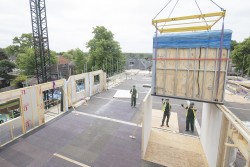The British Institute of Kitchen, Bedroom & Bathroom Installation (BiKBBI) is a government sanctioned, not-for-profit organisation, dedicated to improving standards within the industry. Chief Executive Damian Walters spoke to us about where ‘pod ‘technology fits into what they provide?
Launched in 2006, the Institute represents the installation sector in the UK and works with professional installers, retailers and manufacturers, whilst providing consumers access to free practical advice and an informed choice. Representing the largest network of independently accredited kitchen and bathroom installation specialists, BiKBBI delivers across three core pillars – education, standards and support.
“Working with enormous volume, with experience working with several retailers, it was clear back in 2006 that there was a need for an association to support the sector,” says Damian. “No barriers to entry, little compliance, no real routes to education – either for newcomers via apprenticeships or for the time served installer – and an unacceptable level of consumer complaints that rose each year, led me to explore an organisation that could address these topics.”
Away from the retail consumer sector, the growth in offsite construction has seen the kitchen and bathroom pod manufacture and supply base expand across a range of sectors from healthcare and education to student accommodation. Arguably, it is currently one of the aspects of offsite manufacture where some of the greatest efficiencies rest. How is the Institute grappling with the changes in production and consumption?
“Simply speaking, the industry has a responsibility to evolve to meet the ever-changing needs of the market and our environment,” says Damian. “We must all explore new ways of working with a view to continually improve the service we deliver, especially considering the environmental impacts that ‘tradition’ brings, coupled with the very real challenge of the widening skills gap crisis we’re experiencing globally.
“If we can reduce our carbon footprint, relieve some of the reliance for on-site assembly from a shrinking workforce and do so whilst ensuring quality is maintained, then BiKBBI is more that supportive of the prospect of offsite construction – be that from a product perspective or bigger still, home construction itself. We’re already working with a housebuilder on the topic of modular build and we’re happy to expand our support to others.”
The strengths and benefits of factory-built bathrooms– compared to traditional fit-out are wide-ranging, including greater certainty of completion on-time and on-budget, reduced time on-site and of course a faster return on investment with all the quality that factory production processes provide.
“We live in a ‘plug-and-play’ society these days, and clearly speed of application is something we all strive for, for a number of reasons,” says Damian. “Cost is clearly a factor with pod manufacture and installation, but only if it doesn’t compromise quality. In the same way that pre-fabricated homes were a ‘cheap and cheerful’ post-war housing solution, pod manufacturing years ago was just that, but the modern consumer demands better quality and in many respects are prepared to pay for it. I believe the opportunity therefore is widespread, with clear wins in the newbuild sector. To reduce the reliance of a sub-contracted workforce, first and second fit-outs on-site will be a positive for the industry, the housebuilders, the client and ultimately the economy.”
With the interest in bathroom pod technology growing, BiKKBI is making the effort to create a strategy to support the growing number and interest in offsite producers and installers – and attract as members. “This is a fast moving area,” adds Damian. “We’ve already introduced new membership categories to accommodate offsite workers (complimenting existing membership categories that support on-site operatives) and we’re working with a number of agencies on the topic of training, development and assessment of modular workers. Like anything, our focus will be driven by demand, so we invite expressions of interest from anyone wanting to find out more.”
One area of note is the possibility that the offsite sector may take work away from the traditional installer supply chains. With issues surrounding system and component reliability and quality – factory-built bathrooms can have enormous benefits compared to site-install. Is there anything the ‘traditional’ supply and install trade can learn from the ‘pod’ delivery model, to improve the way kitchens and bathrooms are installed across all sectors?
“The market is big enough to accommodate all (thankfully one of the only benefits associated with a skills gap),” says Damian. “Traditional installers of course have the same opportunities to develop their skills and perhaps enter a new and largely untapped market. I see this as an opportunity to the industry and not a threat. What can be learned? Simple. cost, efficiency and thinking with future proofing of the industry in mind. Whilst this may not work in every setting and situation, it is something that should be explored as an option and if you do – we’re here to help.”
For more information visit: www.bikbbi.org.uk
To view the article along with the complete Offsite Magazine click here









